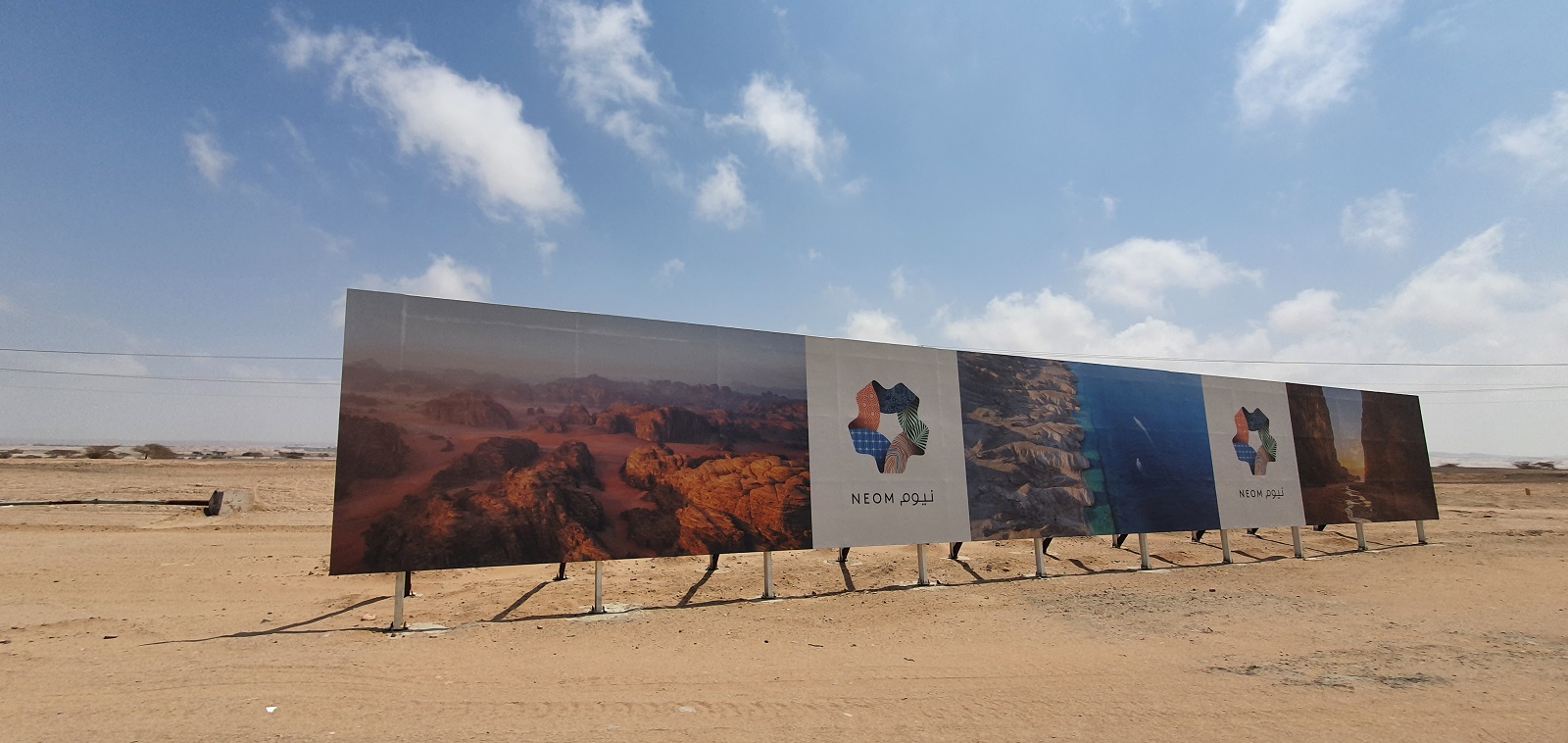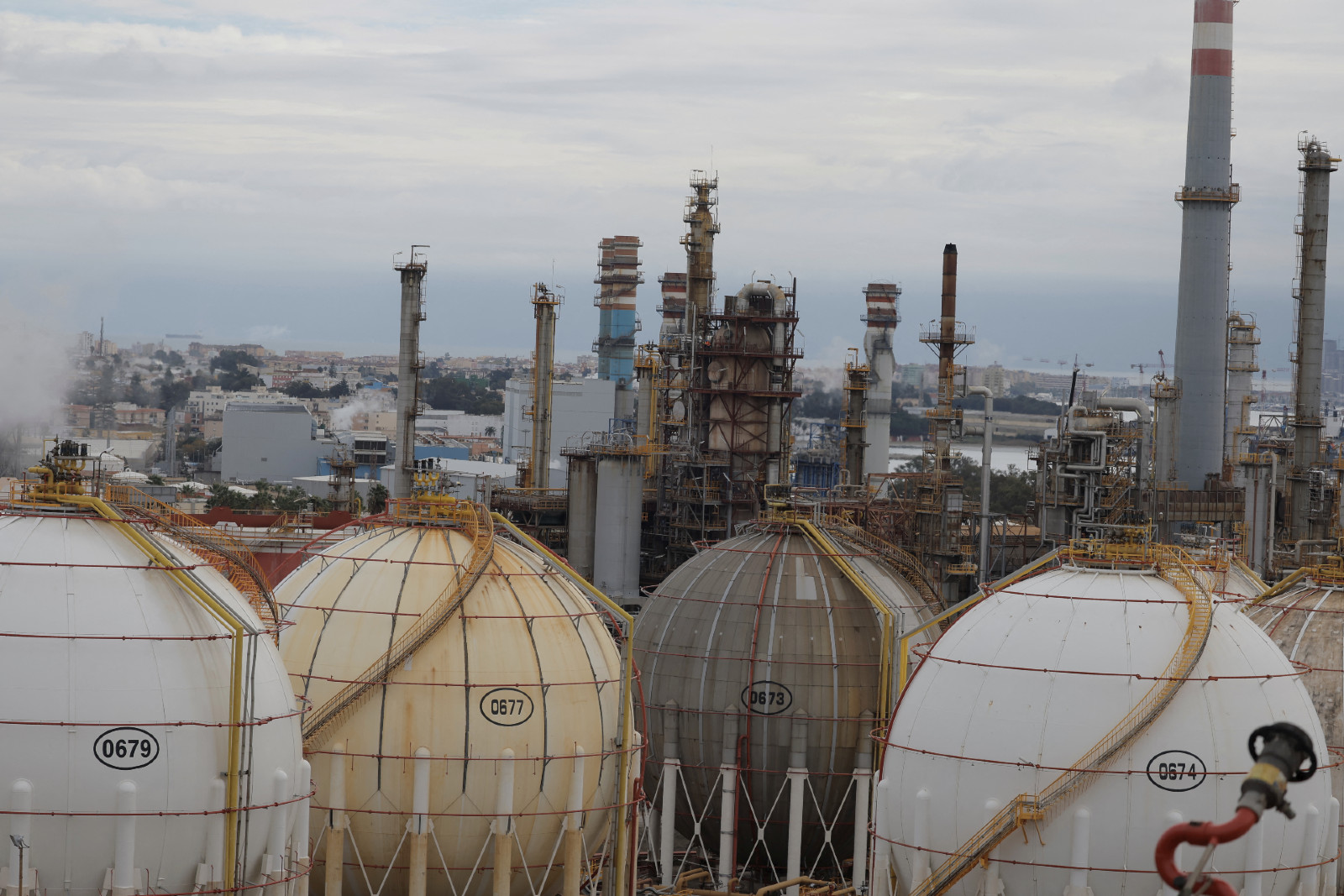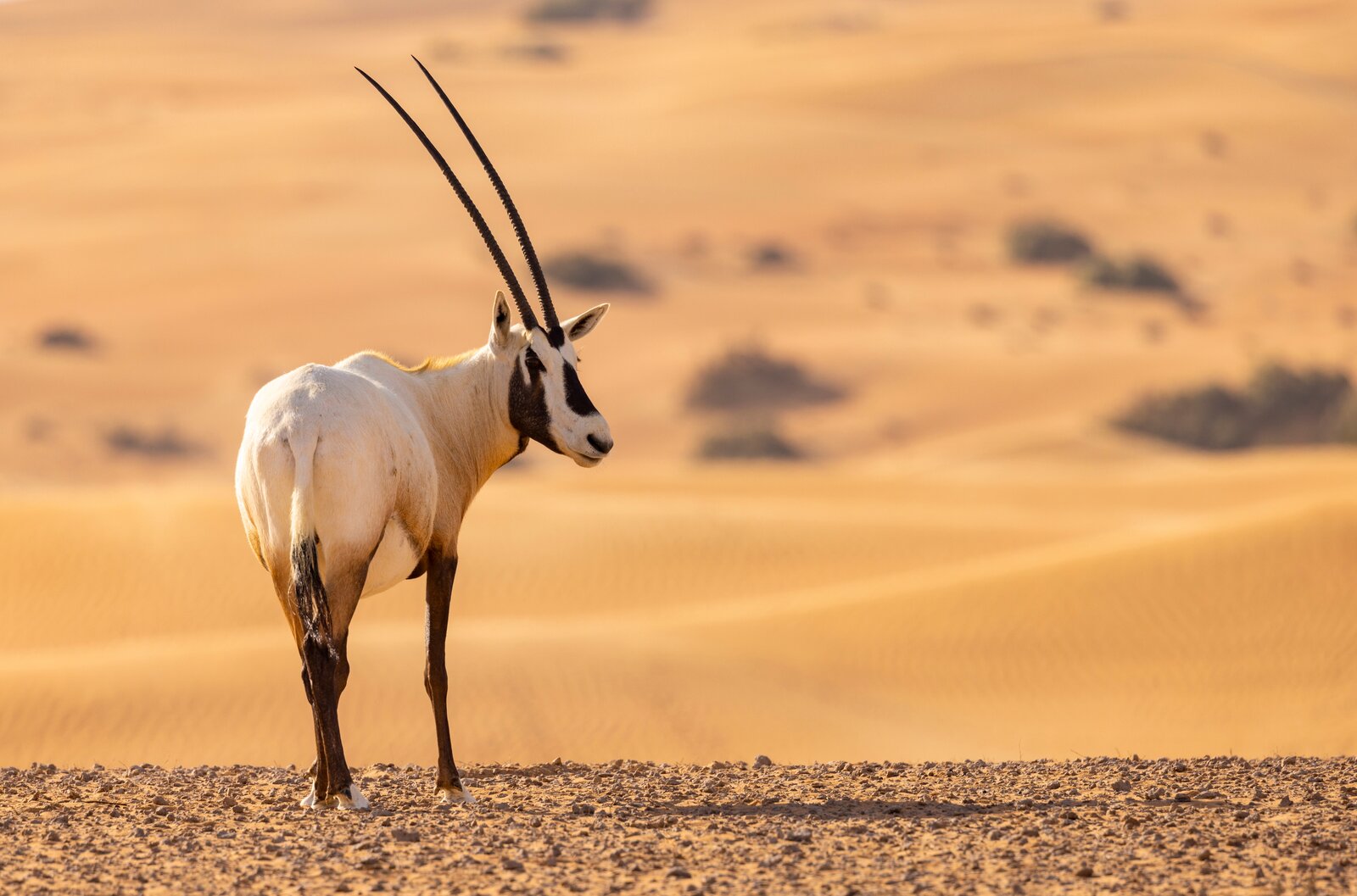- Neom’s USD 5 bn green hydrogen plant is expected to reach financial close early in 2023. (Green Hydrogen)
- Saudi-Korean JV FCI wants to invest USD 115 mn in hydrogen fuel cells by 2027. (Investment Watch)
- Emirates Global Aluminium will supply Nissan with solar-produced aluminum for automotive body sheets. (Aluminum)
- COP15 finds consensus on historic 30×30 framework agreement. (COP15 Watch)
- 2022 was a hydrogen-heavy year — here’s a rundown of all that happened. (Hydrogen)
- Saudi Arabia wants to help Azerbaijan to export green electricity to Europe. (What We’re Tracking Today)
- UN’s António Guterres announces plans for a “no-nonsense” climate summit in 2023. (What We’re Tracking Today)
- Neom is repopulating its lands with four species of native wildlife. (On Your Way Out)

Tuesday, 20 December 2022
Neom’s USD 5 bn green hydrogen plant finds funding, seeks financial close in 2023
TL;DR
WHAT WE’RE TRACKING TODAY
Good morning, friends, and welcome to a busy day for climate in our neck of the woods. We’ve got an accidental hydrogen issue for you today — let’s jump right in.
THE BIG CLIMATE STORY- Neom signs financing agreements for green hydrogen plant: The Neom Green Hydrogen Company signed facility agreements with Saudi and international banks for Neom’s USD 5 bn green hydrogen project. It expects to achieve financial close for the project early in 2023.
ALSO- Saudi-Korean JV Fuel Cell Innovations wants to invest USD 115 mn in hydrogen fuel cell production by 2027. The company recently announced that it would construct a new gigafactory in Pohang, targeting the production of 1 GW-worth of fuel cells every year.
^^ We have chapter and verse on these stories and more in the news well, below.
WATCH THIS SPACE- Saudi Arabia is interested in participating in the export of green electricity from Azerbaijan to Europe, Saudi Investment Minister Khalid Al Falih said at the joint commission on cooperation between the two countries in Baku yesterday, Azerbaijani news outlet Trend reported. The leaders of Azerbaijan, Georgia, Hungary, and Romania signed an agreement on Saturday in Romania’s Bucharest to build an underwater electric cable that would go under the Black Sea, marking “a step towards creating a corridor for green energy,” according to Azerbaijan’s President Ilham Aliyev.
KSA already has a foot in the door in Azerbaijan — but it wants more: Saudi’s Acwa Power is currently developing a 240 MW wind farm in Azerbaijan, with reported investment of USD 300 mn — said to be the “first and largest foreign investment” in the country’s renewable energy sector. “However, this is not enough,” Al Falih was noted as saying yesterday. “We would like to implement larger energy projects and join the agreement signed a few days ago by Azerbaijan on the export of electricity to Europe,” he added.
THE BIG CLIMATE STORY OUTSIDE THE REGION- Guterres wants a “no-nonsense” climate summit next fall: UN Secretary General António Guterres intends to hold a “climate ambition summit” in September 2023 to spur more urgent, tangible action on climate change from government, business and civil society leaders, he announced yesterday. Promising a “no-nonsense” summit, Guterres warned that “there will be no room for backsliders, greenwashers, blame-shifters or repackaging of announcements of previous years.” Guterres noted that he would continue with calls he made at COP27 for a “climate solidarity pact” to increase emissions reduction efforts, spur the energy transition and help vulnerable countries adapt to climate change. (Guardian | Reuters | AP)
ALSO- Investors call for bigger emissions slashing from Big Oil this decade: Dutch shareholder activist group Follow This has filed shareholder resolutions with the world’s biggest oil companies to make more substantial emissions cuts this decade in motions that it said have been co-sponsored by investors with some EUR 1.3 tn (USD 1.4 tn) assets under management, it said in a statement yesterday. The motions, submitted to Shell, BP, ExxonMobil, and Chevron, asked the companies to align their 2030 emissions targets with the goals of the Paris Climate Accords by reducing indirect emissions in their value chain. (Financial Times | Reuters | Bloomberg)
|
***
YOU’RE READING ENTERPRISE CLIMATE, the essential MENA publication for senior execs who care about the world’s most important industry. We’re out Monday through Thursday at 4am Cairo / 5am Riyadh / 6am UAE.
Were you forwarded this email? Get your own subscription without charge here or reach out to us on climate@enterprisemea.com with comments, suggestions and story tips.
***
CIRCLE YOUR CALENDAR-
UAE renewable energy firm Masdar will host Abu Dhabi Sustainability Week from Saturday, 14 January to Saturday, 21 January. The event will gather eight presidents and prime ministers and 30k participants in a series of conferences and summits including the Atlantic Council’s Global Energy Forum, the World Future Energy Summit, Masdar’s Green Hydrogen Summit, The International Renewable Energy Agency’s Youth Forum, and the Abu Dhabi Sustainable Finance Forum.
The UAE is hosting the Atlantic Council’s Global Energy Forum on Saturday, 14 January and Sunday, 15 January in Abu Dhabi. The forum will discuss the ongoing global energy crisis and its impact on the green transition, energy security, and decarbonization.
Check out our full calendar on the web for a comprehensive listing of upcoming news events, national holidays and news triggers.
GREEN HYDROGEN

Neom pens financing agreements for green hydrogen plant: The Neom Green Hydrogen Company (NGHC) signed facility agreements with Saudi and international banks, submitting a letter of intent to the Saudi Industrial Development Fund (SIDF) to secure the operating capital for Neom’s USD 5 bn green hydrogen project, according to a statement. Neom will achieve financial close for the project early in 2023, the statement notes.
Financed with help from the government: There is “significant participation” from the SIDF and KSA’s National Infrastructure Fund in the undisclosed financing facilities that Neom will earmark for its project, the statement says, without providing further detail.
What we know about the project: The plant — a JV between Neom, US-based gas supplier Air Products and Saudi Arabia’s Acwa Power — promises to be the world’s largest utility-scale green hydrogen facility, producing 1.2 mn tons of green ammonia annually. The plant will source its power needs from renewable energy projects totaling nearly 4 GW and is expected to be operational in 2026.
Geared towards export: “100% of the green hydrogen produced will be available for global export, in the form of ammonia, through an exclusive long-term agreement with Air Products,” the statement notes.
And Europe may be getting a slice: Air Products may export larger quantities of the region’s hydrogen to Germany, we previously wrote. The company, along with energy company Mabanaft, will build a green hydrogen terminal in Germany to facilitate imports, according to a company statement. The project, which is set to become operational by 2026, will be located in Hamburg’s port, facilitating the import of green ammonia from large-scale green hydrogen production facilities operated by Air Products and its partners — including Neom. Greece has also been exploring green hydrogen imports from Saudi’s Neom, with plans to lay a cable connecting Saudi to Europe, we reported in October.
INVESTMENT WATCH
Fuel cell research and development is getting a boost in KSA and South Korea

Saudi-Korean JV Fuel Cell Innovations (FCI) intends to invest USD 115 mn by 2027 to produce hydrogen fuel cell components at a plant in Korea’s Pohang Blue Valley National Industrial Complex, Korean daily the Korea Herald reports.
The company recently announced that it would construct a new “gigafactory” in Pohang, targeting the production of 1 GW-worth of fuel cells every year, the Korea Herald noted.
It’s researching the development of hydrogen fuel cells: FCI is conducting research into multiple kinds of fuel cells, including fuel cells powered by green hydrogen, captured CO2, and ammonia, according to the Korea Herald. In October, FCI received production approval to manufacture commercial hydrogen products from the state-owned Korea Gas Safety Corporation, it added.
This is part of a larger plan to diversify its products and up its use of clean energy: In July, FCI signed an agreement with Korean refinery S-Oil to develop hydrogen, fuel cells and renewable energy — with plans that include carbon capture, recycling, and developing the technology to create solid fuel oxide cells (SOFCs).
SOUND SMART- SOFCs are often powered by hydrocarbons, including natural gas and methane — but are considered a high-efficiency, low-emissions alternative to energy sources like coal. FCI currently produces SOFCs and molten carbonate fuel cells — high temperature fuel cells that generally run on hydrocarbons, the Korea Herald noted.
One immediate priority for FCI is to produce high-efficiency SOFCs to power buildings and ships: The company intends to launch 45 kW SOFCs in early 2023, to be used in mid-sized and large buildings. In early December, FCI opened a facility in Korea’s Daejeon that can produce 3 MW-worth of 1.5 KW SOFCs per year, to power buildings and houses, the Korea Herald noted. The company is also reportedly developing “high capacity” fuel cells for ships by 2024.
FCI plans to set up a KSA HQ in 2023 and a green hydrogen plant at some point: FCI intends to launch its Saudi headquarters in Riyadh in 2023, as part of its KSA and South Korea-focused expansion plans in the coming years, the Korea Herald noted. The company also intends to build a green hydrogen plant in KSA, although there are no details available on the planned timeframe.
So far, its work in KSA has been in supplying products to strategic sectors: FCI has reportedly been working with its Saudi partner organization Taqnia Energy to provide fuel cell products to electric, telecoms and military facilities in the country, according to the Korea Herald.
Background on FCI: The JV was launched in 2018 to supply products to MENA and Korea. It’s structured as a consortium, and participating companies include KSA’s Saudi Aramco and Taqnia Energy and South Korea’s S-Oil and Samsung.
ALUMINUM
UAE to supply Japan’s Kobe Steel with green aluminum

Nissan will get UAE solar-produced aluminum: UAE state-owned aluminum manufacturer Emirates Global Aluminium (EGA) inked an agreement with Japan’s Kobe Steel to supply solar-produced aluminum for automotive body sheets for Nissan, according to a statement. The body sheet will be used on Nissan’s car doors and bonnets. The financials of the agreement and amounts of aluminum to be supplied were not disclosed.
Nissan is not the first automaker to partner with EGA: BMW Group was the first company to sign an agreement with EGA in 2021 for 43k tons of solar-produced aluminum per year and Mercedes-Benz parts-manufacturer Hammerer Aluminum Industries followed suit in 2022.
How is the aluminum green? EGA signed an agreement with Dubai’s Water and Electricity Authority (DEWA) in 2021 — the first of its kind worldwide — to supply solar energy to power EGA’s CelestiAL aluminum production, according to a 2021 DEWA statement. EGA purchased 1.1 mn MWh worth of energy certificates from Emirates Water and Electricity Company in November to certify its production of 80k tons of CelestiAL.
REGIONALLY- Oman is also moving towards green aluminum production: Aluminum sheet producer Oman Aluminium Rolling Company inked an agreement with Omani biofuels producer Wakud International to purchase biofuel for use in production in November. The B5 biodiesel uses waste products including recycled cooking oil to produce biofuels.
COP15 WATCH

Delegates at the COP15 in Montreal signed the Kunming-Montreal Global Biodiversity Framework in the early hours of Monday — though not without dissenting voices, reports the Guardian. The once-in-a-decade agreement, which was signed by some 196 countries, has been four years in the making and vows to protect 30% of the planet’s oceans and lands by 2030 under the tagline 30×30.
The talks have been led by Canada and China: China, which has been leading the talks at COP15, presented a compromise package on Sunday. The package included a draft Global Biodiversity Framework, a draft strategy on resource mobilization for nature conservation finance, frameworks for monitoring and reporting that allow countries to track their progress, and finally, measures to enhance capacity building, development, and technical and scientific cooperation.
What does the Montreal-Kunming pact include? The agreement, which replaces the 2010 Aichi Biodiversity Targets that emerged from COP10 in Nagoya, Japan, includes 23 targets. The agreement proposes the elimination, phasing out, or reform of environmentally harmful subsidies by a minimum of USD 500 bn each year by 2030 and would see wealthy countries increasing their contributions to aid for biodiversity. It also requests, but does not require, that large companies and financial institutions make disclosures about their operations, supply chains and portfolios, reports Reuters.
Finance remains a sticking point: While the agreement would see wealthy countries increasing their contributions to aid for biodiversity to USD 25 bn annually starting 2025 and USD 30 bn annually by 2030, it falls short of an earlier proposal that saw developed countries committing at least USD 100 bn annually until 2030. It also directs countries to allocate USD 200 bn annually for public and private sector biodiversity initiatives.
Calls for a new biodiversity fund were shut down: Rather than set up an entirely new fund to protect biodiversity, which has been a repeated request of countries from the global south, including Brazil, Indonesia and the Democratic Republic of Congo, the pact sees the creation of a biodiversity fund under the World Bank’s Global Environment Facility (GEF) — a conclusion that outraged many African delegates, with one representative saying that “the agreement was passed by force of hand,” reported the Guardian. Earlier this week, talks stalled after delegates failed to reach a consensus on biodiversity funding.
What is not included in the proposal? The package excludes the EU’s proposal to restore 3 bn hectares of degraded land and freshwater ecosystems and 3 bn hectares of ocean ecosystems, as well as the bloc’s proposal to halve pesticide use and risk. The agreement lacks mention of “nature positive,” or means to halt or reverse nature loss — the biodiversity equivalent of “net zero.”
YEAR IN REVIEW: HYDROGEN

It was an eventful year for hydrogen investments in MENA: From Oman’s setup of its state-owned Hydrogen Oman Company (Hydrom) and outlining a strategy to invest USD 140 bn in green hydrogen by 2050, to Egypt signing agreements totalling USD 83 bn for the development of nine green hydrogen projects in the country, to QatarEnergy declaring it would build the world’s biggest blue ammonia plant, hydrogen created a whole lot of buzz in 2022.
Egypt is leading MENA in terms of value of green hydrogen projects in the pipeline: The government has signed some 16 agreements with private firms to explore green hydrogen and green ammonia projects — including nine framework agreements signed during COP27 with a number of companies to construct several green hydrogen and ammonia facilities in the Suez Canal Economic Zone. These nine facilities would, if implemented, cost a combined USD 83 bn and would collectively produce up to 7.6 mn tons of green ammonia and 2.7 mn tons of hydrogen a year when fully operational.
But Oman outlined a strong plan for green hydrogen production: The country’s strategy for the energy source includes an increase in investment in green hydrogen to USD 140 bn by 2050 including investment in 300 mn solar panels, 10k wind turbines, 5.2k electrolyzers, and hydrogen storage, transport, and desalination. Oman is targeting annual production of 1-1.25 mn metric tons of green hydrogen by 2030, rising to 3.25-3.75 mn metric tons by 2040, and 7.5-8.5 mn metric tons by 2050.
Oman sealed agreements amounting to USD 48.9 bn already — putting it second only to Egypt in MENA in terms of the value of signed project agreements, according to MEED project tracker data released in October. Most notably, Saudi’s Acwa Power and US-based Air Products teamed up with government-owned OQ Alternative Energy back in May on a “multi-bn USD” green hydrogen project in Oman’s Salalah Freezone.
Saudi Arabia also had a big green hydrogen year: KSA’s Neom Hydrogen company signed facility agreements with Saudi and international banks, and submitted a letter of intent to the Saudi Industrial Development Fund (SIDF) to secure the operating capital for Neom’s USD 5 bn green hydrogen project just this week (as we note in Green Hydrogen, above). The plant promises to be the world’s largest utility-scale green hydrogen facility, producing 1.2 mn tons of green ammonia annually. KSA’s Public Investment Fund (PIF) also inked an agreement last month worth some USD 6.5 bn with Korea Electric Power Corp (Kepco) and four other South Korean firms to build a hydrogen and ammonia plant with a yearly generational capacity of 1.2 mn tons.
Let’s not forget KSA’s blue ammonia: Saudi Aramco and Sabic Agri-Nutrients shipped the world’s first commercial load containing 25k tons of blue ammonia to South Korea last month, and Saudi mining company Maaden is also expected to export a similar shipment of blue ammonia to the East Asian country by the end of the year.
And its expansion on hydrogen capacity abroad: KSA’s Acwa Power has been investing heavily in a southeast Asian expansion and will establish a USD 7 bn green hydrogen and derivatives production project in Thailand, targeting the production of 225k tons of green hydrogen annually.
The Emirates also wants to become a major exporter: The country sent its first low-carbon ammonia shipment to Europe back in September, and has its sights set on exporting 25% of global low-carbon hydrogen export markets and has seven projects in the pipeline. UAE’s Adnoc is currently developing a low-carbon ammonia plant that will produce 1 mn tons per year at its industrial services and logistics hub in the Ruwais Industrial Complex.
Qatar is also going big on hydrogen production: QatarEnergy’s renewables arm signed agreements yesterday to build the world’s largest blue ammonia plant, with a USD 1 bn price tag.
Last but not least, Morocco: The country received EUR 38 mn from Germany to finance its first green hydrogen plant and the private sector is interested in the country’s potential as well, with Indian conglomerate Adani Group eyeing investments in renewables projects with a 10 GW capacity to supply green ammonia to Europe. Morocco’s Gaia Energy will use Israeli H2Pro’s electrolyzer tech to accelerate its green hydrogen generational capacity for export to Europe.
ON YOUR WAY OUT

Four species of native wildlife return to Neom desert: Oryx, ibex, mountain gazelles and sand gazelles now roam the desert in Neom marking the first phase of a rewilding initiative in collaboration with the National Center for Wildlife (NCW), according to a press release. The animals in Riyadh in late October and spent a period of time in pens to acclimatize to their new environment before being released Neom’s Nature Reserve. “This is the first time that oryx have walked the sands of Neom for nearly 100 years,” head of Neom Nature Reserve Paul Marshall said.
Neom has ambitious wildlife conservation goals: Neom Nature Reserve aims to become home to one of the world’s biggest rewilding and re-greening programs, preserving 95% of the region’s land and sea for nature, the statement notes. The program includes the NCW wildlife breeding initiative which aims to “restore wildlife abundance, reintroduce rare or locally near-extinct wildlife species and ensure protection of wildlife from illegal hunting,” according to the release.
CALENDAR
DECEMBER
7-19 December (Wednesday-Monday): The UN’s 15th meeting of the Conference of the Parties to the Convention on Biological Diversity (COP15), Montreal, Canada.
13-14 December (Tuesday-Wednesday): Seminar on EU standards for agri-food products for the Gulf Cooperation Council countries, Grand Millennium Business Bay Hotel, Dubai, UAE.
13-15 December (Tuesday-Thursday): International Renewable Energy Congress, Hammamet, Tunisia.
17-18 December (Saturday-Sunday): Sharjah Entrepreneurship Festival, Sharjah Research Technology and Innovation Park, UAE.
JANUARY 2023
10-12 January (Tuesday-Thursday): The Future Minerals Forum, Riyadh, Saudi Arabia.
12 January (Thursday): Business Transition to Net-Zero – the Path Towards a Successful Low-Carbon Future Forum, Bahrain.
13 January (Friday): The International Renewable Energy Agency’s Youth Forum, Abu Dhabi, UAE.
14-21 January (Saturday-Saturday): Abu Dhabi Sustainability Week, Abu Dhabi, UAE.
14-15 (Saturday-Sunday): Global Energy Forum, Abu Dhabi, UAE.
16-18 January (Monday-Wednesday): EcoWASTE, Abu Dhabi National Exhibition Center (ADNEC), UAE.
16-18 January (Monday-Wednesday): World Future Energy Summit, Abu Dhabi National Exhibition Center (ADNEC), UAE.
22-24 January (Sunday-Tuesday): ESF MENA 2023 – Energy and Sustainability Forum, Manama, Bahrain.
January 2023: Bid submission deadline for green hydrogen projects to Hydrogen Oman (Hydrom).
FEBRUARY 2023
6-8 February (Monday-Wednesday): Saudi International Marine Exhibition and Conference, Hilton Riyadh, Saudi Arabia.
13-15 February (Monday-Wednesday): The Egypt Petroleum Show (EGYPS) 2023, Cairo, Egypt.
21-22 February (Tuesday-Wednesday): The Arab Green Summit, Dubai, UAE.
21-23 February (Tuesday-Thursday): World Environment, Social and Governance (ESG) Summit, Dubai, UAE.
MARCH 2023
15-19 March (Wednesday-Sunday): Qatar International Agricultural and Environmental Exhibition, Doha, Qatar.
MAY 2023
1-4 May (Monday-Thursday): Arabian Travel Market, Dubai World Trade Centre, Dubai, UAE. Register here.
29-31 May (Monday-Wednesday): Electric Vehicle Innovation Summit, Abu Dhabi National Exhibition Centre, Abu Dhabi, UAE.
JUNE 2023
Bloomberg New Economy Gateway Africa Conference, Marrakesh, Morocco.
1-3 June (Thursday-Saturday): Envirotec and Energie Expo, UTICA, Tunis, Tunisia.
SEPTEMBER 2023
Chariot Limited and Total Eren’s feasibility study on a 10 GW green hydrogen plant in Mauritania to be completed.
OCTOBER 2023
2-4 October (Monday-Wednesday): WETEX and Dubai Solar Show, Dubai World Trade Centre, Dubai, United Arab Emirates.
NOVEMBER 2023
6-17 November (Monday-Friday): The UAE will host COP28.
EVENTS WITH NO SET DATE
End-2022
KSA’s Neom wants to tender three concrete water reservoir projects to up its water storage capacity by 6 mn liters.
2023
Early 2023: Egypt’s KarmSolar to launch KarmCharge, the company’s EV charging venture.
1Q2023: Oman will award two blocks of land for green hydrogen projects in Duqm, Oman.
Mid-2023: Sale of Sembcorp Energy India Limited to consortium of Omani investors to close.
Phase C of the 900-MW of the Mohammed bin Rashid Al Maktoum Solar Park in Dubai to be completed.
Saudi Basic Industries Corporation (Sabic) steam cracker furnace powered by renewable energy to come online.
4Q2023: Oman to award four blocks of land for green hydrogen projects in Thumrait, Oman.
2024
End-2024: Emirati Masdar’s 500 MW wind farm in Uzbekistan to begin commercial operations.
QatarEnergy’s industrial cities solar power project will start electricity production.
First 1.5 GW phase of Morocco’s Xlinks solar and wind energy project to be operational.
2025
Second 1.5 GW phase of Morocco’s Xlinks solar and wind energy project to be operational.
UAE to have over 1k EV charging stations installed.
2026
1Q 2026: QatarEnergy’s USD 1 bn blue ammonia plant to be completed.
End-2026: HSBC Bahrain to eliminate single-use PVC plastic cards.
Iraq’s Mass Group Holding wants to invest EUR 1 bn on its thermal plant Mintia in Romania to have 62% of run on renewable energy, while expanding its energy capacity to at least 1.29k MWh.
2027
MENA’s district cooling market is expected to reach USD 15 bn.
2030
UAE’s Abu Dhabi Commercial Bank (ADCB) wants to provide AED 35 bn in green financing.
UAE targets 14 GW in clean energy capacity.
Tunisia targets 30% of renewables in its energy mix.
Qatar wants to generate USD 17 bn from its circular economy, creating 9k-19k jobs.
Morocco’s Xlinks solar and wind energy project to generate 10.5 GW of energy.
2035
Qatar to capture up to 11 mn tons of CO2 annually.
2045
Qatar’s Public Works Authority’s (Ashghal) USD 1.5 bn sewage treatment facility to reach 600k cm/d capacity.
2060
Nigeria aims to achieve its net-zero emissions target.
Enterprise Climate is available without charge thanks to the generous support of HSBC (tax ID: 204-901-715), the leading corporate and retail lender in Egypt; and Infinity Power (tax ID: 305-170-682), the leading generator and distributor of renewable energy in Africa and the Middle East. Enterprise Climate is delivered Mon-Thurs before 4 am UAE time. Were you forwarded this copy? Sign up for your own delivery at climate.enterprise.press. Contact us on climate@enterprisemea.com.

